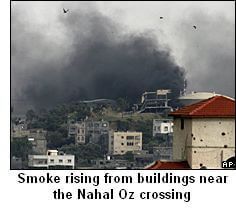 A brief survey of some UK media’s coverage of a Palestinian terror attack on the Nahal Oz fuel depot identifies some examples of subtle bias and weak reporting.
A brief survey of some UK media’s coverage of a Palestinian terror attack on the Nahal Oz fuel depot identifies some examples of subtle bias and weak reporting.
- Skewed headlines:
“Israel hits back after two die in crossing attack“:
Despite the fact that Palestinian terrorists instigated this fatal cross-border attack on Nahal Oz, The Guardian’s headline places the emphasis on Israel.
Compare this with the Financial Times’s “Palestinian gunmen attack Gaza crossing,” which uses the active tense and correctly attributes responsibility to the Palestinian side for the attack.
“Two Israelis die in battle at fuel terminal“:
In similar style to The Guardian, The Daily Telegraph also employs a passive headline to describe the fate of the two Israeli civilians murdered by the terrorists – In both headlines, rather than attributing this to the actions of the terrorists, the Israelis simply “die”.
- Missing context:
The Times and Sky News fail to mention the target of the Palestinian attack – the fuel depot – instead referring to a “border crossing”. While this may be technically correct, failing to detail the main target of the attack is a major omission. Compare this with The Independent’s detailed report which includes Israeli Prime Minister’s spokesman Mark Regev’s comment: “The Hamas attack on the fuel terminal that supplies Gaza its energy shows their total and complete disregard for the civilian population of Gaza.”
At a time when Israel is blamed for fuel shortages in Gaza, it is certainly relevant to point out how Palestinian terrorists are actively seeking to worsen the humanitarian situation by targeting a fuel depot and the border crossing that facilitates vital aid and supplies to the Palestinians.
Indeed, the myth of a total blockade is only exacerbated by statements such as The Daily Telegraph’s: “Israel has cut supplies of diesel, petrol and cooking gas in recent months”. In fact, humanitarian supplies have continued to flow through Israeli border crossings despite Palestinian terror.
- Downplaying terror:
A common theme for much of the media is the failure to adequately convey the continuous rocket fire on Sderot and its environs. The Financial Times, however, goes even further, claiming that “Hamas has curbed the rocket fire on Israeli towns” during the past month, while the BBC refers to a “lull in the violence”.
For the residents of Sderot and the Negev region does the past month (statistics available up to 1 April) look like a “ceasefire” or “lull in the violence”?
28 March: Two Qassam rockets struck the Negev: one hit a kindergarten in a kibbutz. The teacher and the children managed to reach a protected room and no one was injured.
26 March: A barrage of 22 rockets landed in the western Negev. Three people were wounded from shrapnel, one a Sudanese refugee. One of the rockets caused heavy damage to a house and nearby buildings in a kibbutz south of Sderot.
An Israeli farmer was wounded when terrorists in Gaza fired at Kibbutz Ein HaShlosha (where, on 15 January this year, a volunteer from Ecuador was murdered in the fields in a similar attack).
20 March: A rocket hit Kibbutz Nir-Am, breaking windows.
13 March: A Qassam rocket caused damage to a football field and a shed.
12 March: Rockets damaged buildings in Sderot.
11 March: A rocket hit an industrial park south of Ashkelon.
In addition, on 4 April, an aide to Public Security Minister Avi Dichter was shot and wounded while leading a 15-member Canadian Jewish delegation to a lookout point over the Gaza Strip after the group came under Palestinian sniper fire.
Qassam fire on Sderot has also continued right up until the day before the Nahal Oz terror attack.
- Faulty terminology:
The Palestinians who carried out this attack deliberately targeted civilian infrastructure and murdered two Israeli civilians – there should be no doubt that this was a terrorist attack carried out by terrorist organisations. Yet, all of the media outlets refer to the terrorists as “militants” or “gunmen”. HR UK will continue to campaign for the media to accurately describe terrorists as terrorists.
For detailed and accurate coverage of events, refer to sources such as The Jerusalem Post, Ha’aretz and YNet News.
To comment in the letters pages of any of the media outlets referred to above, send your e-mails to:
Daily Telegraph – [email protected]
Financial Times – [email protected]
The Guardian – [email protected]
The Independent – [email protected]
Sky News – [email protected]
The Times – [email protected]
IRISH EYES WATCHING ISRAEL
A new blog – Watching Israel – examines Irish media coverage of Israel and other related issues.
SUCCESS: TIMES ACKNOWLEDGES PHOTO GAFFE
For those of you who are not subscribers to our international .com site, click here to see HonestReporting’s latest success as The Times admits an error, publishes a correction and acknowledges HonestReporting’s role in securing this admittal.

